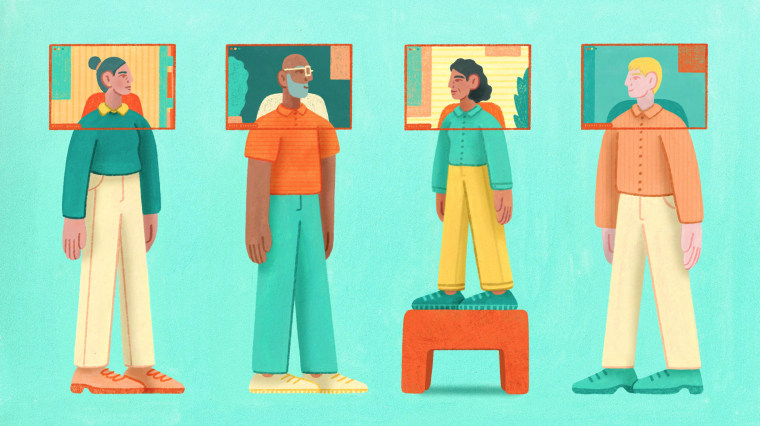I’ve been vaccinated and am now enjoying many of the pleasures of the real world — the opportunity to meet with friends without fearing infection, to dine at outdoor restaurants and to actually take a long walk without a mask.
Often in this safe space, where you literally didn’t have to watch your back, conversations have been deeper, more personal.
But the virtual world has given me one gift I couldn’t obtain in this three-dimensional one: For once, my size — under 5 feet tall and weighing less than 100 pounds — has no longer been an impediment. Suddenly, I had the same voice and authority as the most imposing person in the room.
My Zoom box has been exactly the same size on screen as that of everyone else. When it comes to the space we take up in the world, we have all been equal.
Size has not been the only obstacle that the virtual world removed. What we wear hasn't mattered. We have been mostly in the same boat when it's come to the state of our hair. Best of all, the Zoomocracy has required us to wait our turn to speak. We have been forced to be polite and observant.
I recognize that the equality Zoom has offered some of us doesn’t apply to all, that living virtually has not been an advantage everyone has shared. The “essential workers” in the real world who stocked our larders, took care of us when we were sick and delivered our takeout haven’t had this freedom. And not everyone has had access to a computer and high-speed internet back home.
But I am grateful for the advantages this new state of affairs have offered me and many others. I’m even a little surprised to have Zoom nostalgia for this facet of my pandemic life, particularly its ability to make me feel connected to other people more deeply and honestly. As we return to the unplugged world, I hope we can bring some of the attentive listening and vulnerability the virtual world encouraged.
Trapped in our homes, without the worry of traffic or other logistics, it has been easier to respond to more Zoom invitations, even those that didn’t have a payoff in terms of advancement at work or making the right contacts. We have allowed ourselves the luxury of curiosity.
We have been able to reconnect with old college classmates and members of parent groups we’d pretty much dissolved after our kids grew up. Often in this safe space, where you literally didn’t have to watch your back, conversations have been deeper, more personal.
We’ve been willing to share feelings and glimpses of our private lives. Having all been some level of lonely or depressed or anxious, it's been far easier to be vulnerable with one another.
As a friend put it, “We were in boxes, but not compartmentalized.” We have seen glimpses of one another’s homes, some grand, others homey and cluttered, many featuring cameos by meandering spouses, children or pets. The FOMO that often dogged us fell away.
And the expression of authentic emotion has been a revelation. Those of us lucky enough to be working professionals had often devoted our energies more to networking than to nurturing our friendships. We have been more likely to exchange resumes than holiday cards. I don’t think I’ve attended a party in recent years without Googling the guests in advance to see who might offer the right connections for my career or my child’s.
This past year has given me a respite from those preoccupations. I haven’t handed out a business card in 15 months. I haven’t felt the need to be competitive. If I was depressed or disheveled, I could lurk and listen. I could always make my voice heard through the chat box or just express my thoughts to one person if I didn’t want to take center stage.
For some of us, our new reality opened doors that should never have been closed. Suddenly, pandemic-driven technology has brought many of those with physical disabilities into family and friendship circles that had been inaccessible. Hanging out with friends, attending conferences, listening to lectures and even holding certain jobs have been within closer reach.
Of course, Zoom hasn’t been perfect. The technology can be unreliable, and not all virtual meetings are inspiring. But as we emerge from our socially isolated cocoons, there’s no reason we can’t adapt some of the positive lessons we've learned from living virtually.
I know many of my physicians have now embraced telemedicine. Clearly it has its limitations, but it can be a useful way to monitor patients, especially older people with chronic illnesses. Likewise, employers, professional groups and schools have grasped what’s possible in a hybrid world — where in-person learning and working can be adapted to permit virtual participation.
I’m not as hopeful about my own personal growth. I’d like to think that 15 months of listening and sharing have made me a better, more tolerant person, but I know it’s going to be difficult to not quickly revert to putting on my professional face, digging out my business cards, donning those high heels and fighting for as much space as I can claim.



